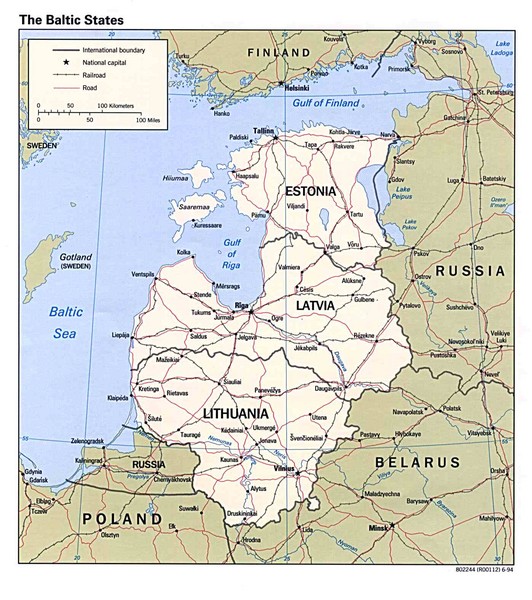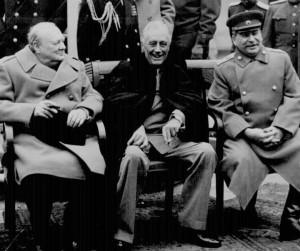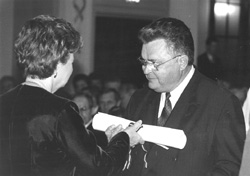Talking Churchill in the Baltic, 1995

Walter Russell Mead in The American Interest finely described the Museum of the KGB. In the Lithuanian capital of Vilnius, it documents victims of the Soviet occupation, 1940-91:
Yet those poor Lithuanian partisans who fought a hopeless guerrilla campaign against the Soviet occupation after 1945 kept waiting for us to show up,” Mead continued. “Apparently they made the mistake of believing all those fine words that Franklin Roosevelt and Winston Churchill wrote in The Atlantic Charter.
I have no doubt that Roosevelt and Truman were right to avoid war with the Soviet Union after World War Two…But war over eastern Europe in 1945 was unthinkable; containment was the best we could do.
A visit to Latvia
 North of Lithuania is Latvia, home of some of my ancestors, where three friends and I bicycled in 1995 on the 50th anniversary of V-E Day. The ostensible reason was to celebrate the ongoing battle waged by Baltic partisans against the renewed Soviet occupation, following the “liberation of Europe,” as we all comfortably referred to it in the West back in 1945.
North of Lithuania is Latvia, home of some of my ancestors, where three friends and I bicycled in 1995 on the 50th anniversary of V-E Day. The ostensible reason was to celebrate the ongoing battle waged by Baltic partisans against the renewed Soviet occupation, following the “liberation of Europe,” as we all comfortably referred to it in the West back in 1945.
Our way had been made smooth by the late Richard Ralph, then Her Majesty’s Ambassador to Latvia, who arranged for us to stay at the British Embassy in Riga , and to meet various functionaries on our 410-mile ride from the Lithuanian to the Estonian border.

Our first stop was the port city of Liepaja, where with the rain pelting down outside, we breakfasted with the mayor, Teodors Enins (1934-2008). When we said “Churchill,” Mayor Enins said “Yalta,” and the conversation immediately moved into “a frank exchange of views,” as the diplomats put it.
A hard conversation
“You should have nuked them in 1945,” Mayor Enins said of the Russians. He spoke of he fifty-year Soviet occupation, in the midst of which he had grown up. He had strafe marks on his belly, acquired as a young lad on the beaches after dark. He’d been wounded by Soviet soldiers, who patrolled every inch of the Baltic coast.
I said of course that there was no chance of the Anglo-Americans attacking Russia in 1945. We had just clawed down Hitler with them. They were our allies. We had left Yalta in February 1945 holding guarantees of Polish self-determination. That was all we could hope for.
Yalta confirmed postwar Soviet rule in the Baltic States and much of Eastern Europe. With the Red Army occupying half the continent, there were few alternatives except war, which no Western statesman would have launched in those circumstances.
Moreover, we told Mr. Enins, “Things could have been worse. Greece—thanks to Churchill’s oft-denounced ‘spheres of influence’ agreement with Stalin in 1944—was liberated. So in the end was Austria. Stalin agreed to enter the war against Japan. All these were promises he kept.”
“You should have fought them”

“But the Polish guarantees proved worthless, didn’t they?” said the mayor. True. Churchill and Roosevelt were in communication about what to do next when FDR died in April 1945. President Truman, ill-briefed as vice-president, moved with caution, unwilling to upset an important ally. Churchill lost the July election and was replaced at Potsdam, the last wartime conference, by Clement Attlee.
I told Mayor Enins how Churchill had written in Triumph and Tragedy that had he returned to Potsdam, he would have forced a “showdown” over Poland. What the result would have been is a matter for conjecture. “Much of Eastern Europe, given harsh reality, had no chance for liberty,” I said, “but we should not denounce the efforts Churchill made.”
Teodors Enins listened politely, but then he just shook his head. “No. You should have fought them anyway,” he said sadly. “Think of how much blood and treasure you would have saved yourselves—not to mention us.”
As in many things, what you think often depends on where you grew up.








One thought on “Talking Churchill in the Baltic, 1995”
The saddest thing is that shortly after WW2 thousands of people believed in help from West and kept resisting Soviets thus sacrificing their lives. This senseless belief was fed by western radio stations and even Churchill’s “Iron Curtain” speech.
Comments are closed.